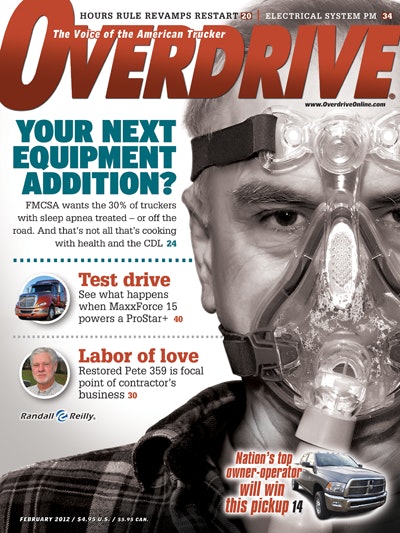
The last meeting of the sleep apnea subcommittee was leaning toward a screening standard including a body mass index measurement and/or certain neck size, including a stand-down order for those drivers required to be tested and/or treated.
Otherwise, today on the blog its Q&A time with Overdrive Equipment Editor John Baxter (pictured below), a man with vast technical knowledge of truck maintenance and systems. If you ever have a technical/maintenance question you want answered, send it my way and I’ll get it to John for an answer. Here’s his latest, responding to a note about the worth of injector-cleaning fuel additives.

Q: Should I bother with fuel additives that claim to clean the injectors?

We spoke with Peter Jutras, senior accounts manager at Howes Lubricator, a Rhode Island company that’s been making fuel additives and selling them to the trucking industry since 1920. “Our Meaner Power Cleaner keeps carbon deposits and varnish off the injector tip,” he says. “Carbon and varnish can rob the injection system of optimum performance.” He explained that deposits can interfere with proper atomization, which, in turn, will mean deteriorated combustion. Diesel experts also talk of deposits as something that can interfere with the “spray pattern,” or the how evenly the fuel is distributed in the combustion air.
Jutras pointed out that in trucks fitted with a DPF, good injection system performance is even more critical than with older vehicles. Clean combustion matters more on these vehicles because of the way soot must be constantly burned off inside the DPF, and the fact that hard deposits can make the unit hard to clean.
He added that the product also contains a lubricity agent to make up for the fact that ULSD is “a drier fuel” than traditional diesel fuel with much more sulfur in it, referring to the fact that refining the fuel to remove sulfur also removes most of its natural lubricating ability. While diesel fuel suppliers add lubricity agents, adding more yourself could offer some assurance that your injectors will be properly lubricated, which will prevent scoring of close fitting parts.
The Howes website has a page that includes a return on investment calculator for their Meaner Power Cleaner. When I input a fuel cost of $3.70 per gallon, the calculator showed a cost of $9.56 per 200 treated fuel gallons for their product, and a potential savings of $27.44 in fuel cost. A one-quart bottle of their additive will treat 320 gallons of fuel.
Although the product can be used to clean injectors that have run for a long time, Jutras suggests continuous use because “once carbon coking develops on an injection nozzle, it can be really hard to get rid of,” he says. Normal savings, compared with not running an injector cleaner, could be in the range of 4.9 percent, he adds.
There are lots of reputable manufacturers of diesel fuel additives that help keep injectors clean. Their products are probably worth a close look-see. –John Baxter
Post technical/maintenance questions in the comments or send them to tdills [at] randallreilly.com.










